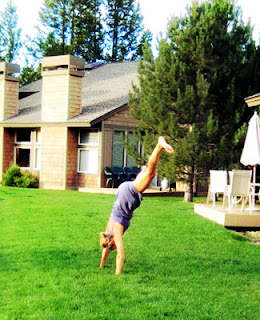 |
| © Krista Stryker 2011 |
As adults this habit comes naturally to us, and we're accustomed to concentrating on our faults the majority of the time. This leads us to spending a disproportionate amount of time fretting over the skills we are "bad" at: public speaking, organization, time management, (insert thing you'd like to be better at here), etc. because we think we need these skills to be a successful person.
This obsession with weakness has been ingrained in us since we were little kids, where we were taught that our strengths just don't matter as much as our weaknesses. This was reinforced by our teachers (through no fault of their own - they are just following the system), and usually through our parents as well.
An A Doesn't Matter as Much as an D...
Think about it.
If a student brings home an A in science class, but a D in English, he is told to focus solely on improving his English grade - while ignoring his obviously natural ability for science.
If a JV basketball player is an incredible defender, but misses every free-throw shot she takes, she is instructed to spend all of her time practicing her free-throws, not further developing her defensive skills.
If a shy teenager is forced to take part in the school's debate team in the attempt to make him a more outgoing person, this is ignoring his natural strength to quietly observe and connect with others in a calm manner.
This is not to say that there is no benefit in having some level of ability to do a lot of things - from a young age onward, kids should be learning a variety of different subject matters and acquiring many different skills through their education and outside activities.
But young people shouldn't be punished because they don't have a natural ability for something. They shouldn't be required to spend all their time improving their skills on a subject or activity that they have no interest or natural talent in. Instead, they should be given ample time to focus on improving what they already have an innate ability for - and so should we.
But young people shouldn't be punished because they don't have a natural ability for something. They shouldn't be required to spend all their time improving their skills on a subject or activity that they have no interest or natural talent in. Instead, they should be given ample time to focus on improving what they already have an innate ability for - and so should we.
Stop trying to be average at everything
As an adult, it's highly counterproductive to focus only on our weaknesses.
Even if we spend hours, days, even years trying to develop our perceived faults, we will only ever really become mediocre at these weaknesses (or they wouldn't be weaknesses, would they?). By spending all of our time attempting to improve our public speaking ability, we will generally become an average public speaker, never an outstanding one.
But what if we took that same drive to improve and put it towards our innate writing ability instead? We would then have the possibility of becoming a fantastic writer, rather than a tolerable speaker.
Discover your strengths...and work to improve them
There is an entire book devoted to the subject of discovering and improving upon your strengths aptly titled, Strengths Finder 2.0 . It's an overall interesting read and discusses further why you should focus on your strengths, but the most useful part of the book is its Strength Finder assessment. The test uses a series of proven questions to determine your top five strengths.
. It's an overall interesting read and discusses further why you should focus on your strengths, but the most useful part of the book is its Strength Finder assessment. The test uses a series of proven questions to determine your top five strengths.
For example, my top five strengths were:
1. Learner: I have a great desire to learn and want to continuously improve.
2. Futuristic: I am inspired by the future and what could be.
3. Individualization: I am intrigued by the unique qualities of each individual person and can figure out how people who are different can work together productively.
4. Input: I have a craving to know more and tend to collect and archive information.
5. Command: I have presence, can take control of situations and make decisions.
Of the five strengths listed in the Strength Finder results, the last one - command - was the most surprising to me.
I've never thought of myself as a person in control, someone able to make decisions for myself or others.
Obviously, this is a strength that is largely undeveloped, giving me a lot of room to improve upon. Which is kind of exciting. (Me? Have presence? I like the sound of that...)
Finding your own strengths
There's no need to buy Strengths Finder 2.0 if you don't want to spend the money (if you're interested though, you can buy it here through an affiliate link). All you need to do is to start becoming more aware of your own abilities and ask yourself these questions:
through an affiliate link). All you need to do is to start becoming more aware of your own abilities and ask yourself these questions:
What have you always felt that you were "naturally good at?" Helping others? Leading? Coming up with great ideas? Focusing?
Do you take the time to practice and improve these areas that you're already strong at, or do you focus instead solely on areas of weakness?
If you asked your friends and family what your strongest attributes were, what would they say? (If you don't know, ask them!)
Once you have your answers, take the time and create a plan on how to further develop your strengths. They are likely your best attributes, and will lead to greater success and confidence if you take the time and effort to develop them.


